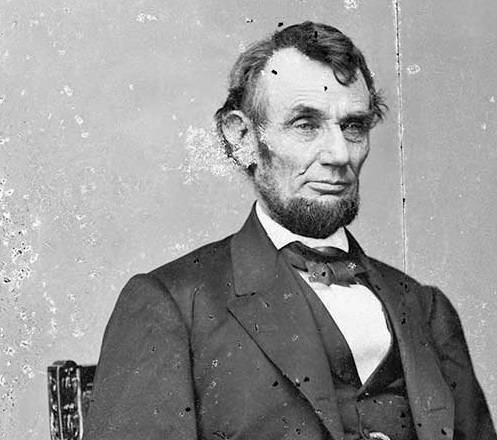Life Lessons from Abraham Lincoln, 150 Years Later

April 15 marks the 150th anniversary of Lincoln’s death. During my school boy years, I had a surface level knowledge of Abraham Lincoln: President during the Civil War, freed the slaves, stove-top hat, unique beard, “four score and seven years ago”, assassinated, coupled with George Washington on Presidents Day, profile found on a penny, etc.
Last summer driving back to Massachusetts from Nebraska, I started listening to the Pulitzer Prize winning book, “Team of Rivals: The Political Genius of Abraham Lincoln,” by Doris Kearns Goodwin and then continued reading it after I got back.
I now have a new list of associations with Lincoln: home-grown scholar, entertaining storyteller, hard-worker, humility, sense of humor, fortitude, father, magnanimity, courageous, diplomatic, shrewd, God-fearing, merciful, faithful friend, hero and even prophetic. Take your pick, learn and then choose another attribute to study from one of our greatest American leaders. The more I read about Lincoln in this excellent book, the more I was impressed and the more his legend grew.
In the last chapters of Goodwin’s book, some, many incidents struck me, some particularly in light of our country’s modern scourge: legalized abortion. Pro-life advocates speak of abolishing abortion and I believe the following words and actions from Lincoln are quite telling about his character and insight.
We learned in school that the Emancipation Proclamation, an executive order signed by Lincoln on January 1, 1863, freed slaves in rebel states. Lincoln feared that this historic decree could be scuttled after the war. Eventually, the push for the Thirteenth Amendment to the Constitution of the United States ensued.
Lincoln pressed two allies in the House of Representatives to secure votes for the passage of the Amendment in January of 1865. A quote from the president rings out.
“I am the President of the United States, clothed with great power,” Lincoln told these allies.
“The abolition of slavery by constitutional provision settles the fate, for all coming time, not only of the millions now in bondage, but of unborn millions to come — a measure of such importance that those two votes must be procured.”
Goodwin points that these men understood the president’s powers included “plum assignments, pardons, campaign contributions, and government jobs for relatives and friends of faithful members.”
But to me, the two words “unborn millions” recalled the unfathomable number of lives lost to abortion — close to 58 million — since Roe vs. Wade and the thousands more who die daily.
Couple that with a passage taken from his Second Inaugural Address on March 4, 1865. Earlier the day had been a rainy and cloudy one. However, journalist Noah Brooks noted that when Lincoln came into sight on the ceremonial platform “the sun, which had been obscured all day, burst forth in its unclouded meridian splendor and flooded the spectacle with glory and light.”
Consider these words of Lincoln toward the end of this iconic speech:
“Fondly do we hope — fervently do pray — that this mighty scourge of war may speedily pass away. Yet, if God wills that it continue, until all the wealth piled by the bond-man’s two hundred and fifty years of unrequited toil shall be sunk, and until every drop of blood drawn with the lash, shall be paid by another drawn with the sword, as was said three thousand years ago, so still it must be said ‘the judgments of the Lord, are true and righteous altogether.’”
How will God judge our nation as abortion continues on? For those of us who consider ourselves “pro-life,” what is our individual and collective role in being actively pro-life? Speaking for myself, surely it is more.
Lincoln and companions visited General U.S. Grant toward the end of the war and again saw first-hand the ravages of war. The recent attack on Fort Stedman left over 2,000 Union casualties and almost 5,000 Confederate ones. Lincoln was reported as saying “that he had seen enough of the horrors of war, that he hoped this was the beginning of the end, and that there would be no more bloodshed or ruin of homes.”
Soon after the fall of Richmond, Virginia, Lincoln toured the former capitol of the Confederacy with companions. A small group of black workers greeted the president with shouts of “Bress de Lord!...dere is the great Messiah!...Glory, Hallelujah!” Several of them fell to their knees. Lincoln’s response?
“Don’t kneel to me, that is not right. You must kneel to God only, and thank him for the liberty you will hereafter enjoy,” Lincoln said.
As I drew toward the end of “Team of Rivals,” I delayed reaching it, knowing how Lincoln would pass. I once heard a priest say — in the aftermath of a horrific murder of a young teacher — that it was a mistake to focus on the details of her death, missing the qualities of how she lived. Likewise, I think there can be too much attention on the assassination of President Lincoln or other fallen leaders. But interestingly, I learned that Lincoln was shot on the evening of Good Friday while sitting next to a woman (his wife) named Mary.
When Lincoln eventually died on the morning of Holy Saturday, his former rival, then current Secretary of War and close friend Edwin Stanton said, “Now he belongs to the ages.”
We are an Easter people and just celebrated Divine Mercy Sunday. I for one, humbly pray to meet Abraham Lincoln in the bosom of Abraham, the heavenly banquet. On this earth, we can learn from his life and pray beyond his death.
Justin Bell writes from the Boston area.













